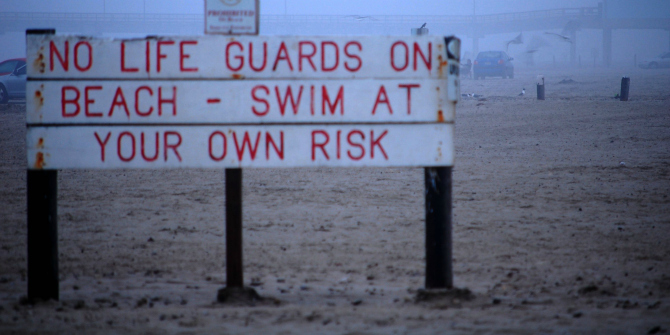 Written in the public glow surrounding the Queen’s Diamond Jubilee, The Grand Delusion is a critical history of Britain’s post-war establishment, with the Queen and her Prime Ministers at its heart. It explores the key questions: has Elizabeth II’s reign been good for the UK? Or has it represented six decades of missed opportunities, deepening inequality and failure to adapt? Paul Ward finds out more.
Written in the public glow surrounding the Queen’s Diamond Jubilee, The Grand Delusion is a critical history of Britain’s post-war establishment, with the Queen and her Prime Ministers at its heart. It explores the key questions: has Elizabeth II’s reign been good for the UK? Or has it represented six decades of missed opportunities, deepening inequality and failure to adapt? Paul Ward finds out more.
 The Grand Delusion: Britain after Sixty Years of Elizabeth II. Stephen Haseler. IB Tauris. August 2012.
The Grand Delusion: Britain after Sixty Years of Elizabeth II. Stephen Haseler. IB Tauris. August 2012.
Stephen Haseler argues that Britain’s political leaders have been suffering under a grand delusion since the Queen’s accession to the throne in 1952. The delusion, he states, is that “in post-war, post-colonial Britain the new head of state, and the English establishment behind her, could not simply recognise that the country’s far-flung empire was indeed lost” (p. xi). This, Haseler, suggests has led the British elite to conduct a global role far beyond the nation’s capacity. To seek to explain why, Haseler provides a political history of Britain in the “reign” of Elizabeth II.
Yet, unsurprisingly, since Haseler has been as active in politics as in scholarly research, this history is less academic than polemic. As well as being emeritus professor at London Metropolitan University, he has been a campaigning constitutional radical. Haseler’s narrative is built to support his political agenda and should be considered to be a contribution to contemporary political debate rather than an exhaustive piece of research. Haseler wants Britain to modernise by removing the monarchy, divorcing the United States and integrating closely with the European Union.
To that end Haseler recounts how British governments of left and right have suffered under the delusion of British power. He considers each post-war Prime Minister – from Attlee to Cameron and explains how, in varying degrees, they subordinated British policy to the United States in the belief that ‘the special relationship’ would help maintain Britain’s global dominance. Limited attempts were made to assert British independence. Ernest Bevin, working-class patriot and foreign secretary, wanted an atomic bomb with a ‘bloody Union Jack on top of it’ and Anthony Eden sought to go it alone in the Suez adventure in 1956. Haseler shows how even potentially radical prime ministers suffered the delusion. Attlee was public-school educated, Wilson was fond of the Queen, Blair – who Haseler suggests saved the monarchy after the death of Princess Diana – did not see a republic as necessary for New Labour’s plans and then fell under the hypnotic influence of American foreign and economic policy. Likewise, Margaret Thatcher was seduced by American neo-conservatism and desired to live by the vicarious imperialism of the new world order. ‘In all but name and manners, and of course formal nationality,’ Haseler writes of Thatcher, she became an American’ (p. 103).
Haseler shows how the tabloid press uses a xenophobic nationalism to sell newspapers and to avoid the constraints on business practice that full European integration would entail. The Sun’s shout of ‘Gotcha’ when 323 Argentine sailors died on the General Belgrano during the Falklands War was jingoism at its worst and was the flip side of the anti-European xenophobia of ‘Up Yours Delors’. He points to the irony that such ‘patriotism’ comes from media empires owned by foreigners.
Haseler suggests that the dire consequence of the delusion is that the British economy has become grossly distorted towards the financial sector because of the ‘hollowing out’ of manufacturing industry under Thatcher’s neo-liberalism and Blair’s embrace of globalisation and marketisation. Haseler provides an excellent account of the (most recent) global financial crisis and its effects on Britain, exacerbated as they are by lack of regulation and over-extension of credit. He points to Britain’s disproportionately large national debt as a drain on society for the benefit of the super rich.
Haseler asks whether Britain can break free from the delusion and adjust to the realities of its global position. While the book claims that he will shed ‘a deeply questioning light on the essence of Britain’s identity today’ it is here that the book is at its least convincing. Haseler considers only Britain’s elites. He doesn’t consider the identities of the British people. It is hard for radical politicians in Britain to face up to the fact that the majority of the British like the Queen, that many have a sense of pride in the imperial nature of British history, and few want closer integration with continental Europe. Of course, loyalty is unevenly spread across the ‘United’ Kingdom and celebration of the jubilee was not uniform. But the Union Jack was everywhere – including in Scotland and in the midst of the ‘British moment’ of jubilee, Euro 2012 and the Olympics, even Martin McGuinness shook hands with the Queen. Republicanism, outside parts of the nationalist six counties, is not a vote winner.
Haseler connects the monarchy and empire to the current economic crisis and staggering inequalities of wealth, but most of the British people do not. Furthermore, Haseler is not clear about how the continuing existence of the monarchy is linked to the enduring desire for British global influence and the special relationship with the United States. They sit in parallel in his book rather than as related and integral parts of the whole. There seems little real reason for the British to abandon the monarchy or to forget the imperial past, though like Haseler, I think they should consider it.
What Haseler reveals is the tremendous variety of reasons for the grand delusion. The public schools and working-class institutions alike have instilled patriotism. Scottish and Welsh as well as British and English nationalists sought a global role and often still want to punch above their weight. The ending of Empire is often seen as a progressive act that confirmed rather than refuted the imperial project. Such echoes of the past act as some minor consolation in a nation in double-dip recession and suffering austerity. It seems, that despite Haseler’s analysis, Britain will remain deluded for some little time yet.
————————————————————————
Paul Ward is Professor of Modern British History and Co-Director of the Academy for British and Irish Studies at the University of Huddersfield. He has published widely on British national identities, including Britishness since 1870 (Routledge, 2004) and Huw T. Edwards: British Labour and Welsh Socialism (University of Wales Press, 2011). He is currently writing a book about the Beefeaters at the Tower of London as global symbols of Britishness. Read more reviews from Paul.








1 Comments